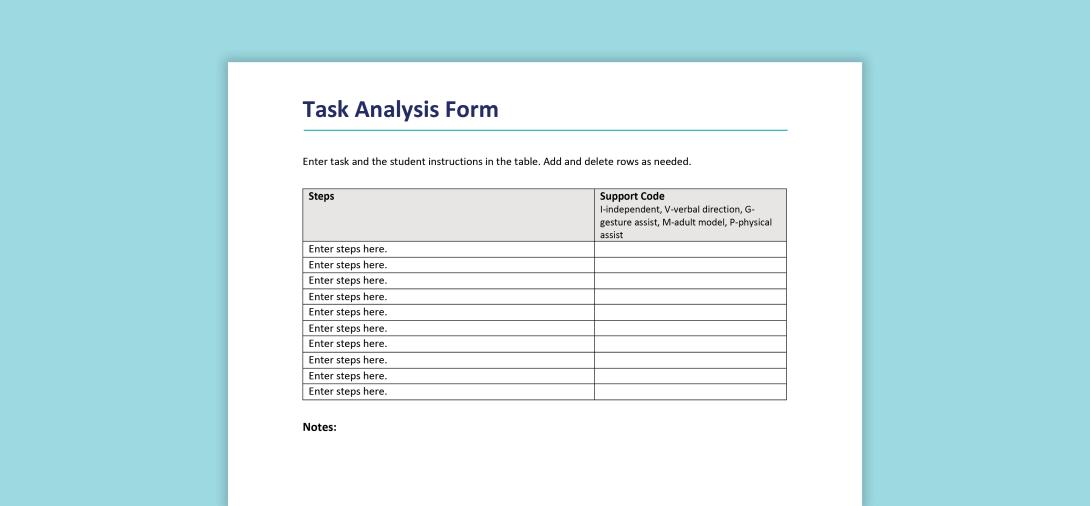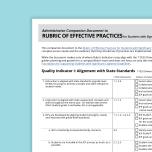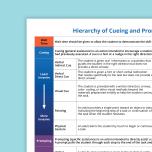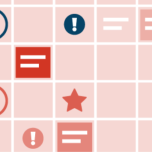Task Analysis Form
This form can be used to break down the steps of an activity and indicate the support the student required for each step.
Task analysis is the process of breaking down a task, skill, or process into smaller steps. An educator identifies which steps a student can complete independently, then investigates what supports the student may need to learn the other steps while working towards mastery.
Educators may find this tool most useful for students who are accessing the curriculum (TEKS) at prerequisite levels and routinely participate in alternate or non-traditional methods of assessment. These students may be in the process of developing a functional and consistent mode of communication (e.g., currently non-verbal, uses very limited non-symbolic communication) and require individualized supports (e.g., modifications, task analysis, direct instruction, assistive technologies, first/then charts, tactile schedules, social narratives) and ongoing adult assistance (e.g., prompting, cueing, physical assist) to participate in on-topic academic exchanges.
This document aligns with the Rubric of Effective Practices for Students with Significant Cognitive Disabilities Quality Indicator II: Effective Teams.
Related Content
ARD/IEP Supports,
Behavior,
Significant Cognitive Disabilities,
Autism,
Evaluation
This video shows one educator sharing how she uses a task analysis data collection form. This form is intended for use by teachers, paraprofessionals, and other service providers collecting data for student Individualized Education Program (IEP) goals and baseline data to determine a need for new/updated IEP goals or behavior intervention.
Significant Cognitive Disabilities
Explore the key themes from Quality Indicator II: Effective Teams in the Rubric of Effective Practices for Students with Significant Cognitive Disabilities.
Significant Cognitive Disabilities,
Behavior,
Instruction,
ARD/IEP Supports,
Inclusion
This rubric highlights best practices to facilitate learning for students with complex access needs. The document should be used as a guide by a campus/district team as they engage in reflection of their current practices and plan for program growth (T-TESS Dimension 4.2). To aid administrators in
Significant Cognitive Disabilities,
ARD/IEP Supports,
Instruction,
Assistive Technology,
Behavior,
Inclusion
This document provides administrators with best practices to facilitate learning for students with the most complex access needs and the evidence that they should see if practices are implemented.
Significant Cognitive Disabilities,
Instruction
This rubric can be used to obtain a more specific and objective activity grade.
Significant Cognitive Disabilities,
Instruction
This grading rubric scenario demonstrates how to identify prerequisite skill access points to TEKS, provide instruction that integrates individual accommodations and modifications, pre-plan individual supports, and use task analysis to determine individual student mastery of an assignment or activity
Autism
Discover the power of task analysis to teach complex skills. Learn its benefits, steps, and find resources for successful implementation.
Significant Cognitive Disabilities,
Instruction
In this video, Ayo Jones elaborates on the concept of scaffolding by using task analysis to teach skills through forward or backward chaining.
Significant Cognitive Disabilities,
Instruction
This chart organizes the levels of support a student might need from least to most invasive.
Significant Cognitive Disabilities,
Instruction
This month’s focus is on building relationships and collecting data. The content aligns with Quality Indicator II: Effective Teams on the Rubric of Effective Practices for Students with Complex Access Needs and the Administrator Companion Document to the Rubric of Effective Practices for Students











